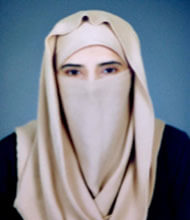
Computer Science
Education
- Ph.D. in Computer Science, IBA, Karachi, Pakistan.
- M.S. in Computer Science, SZABIST, Karachi, Pakistan.
- B.S. in Computer Science, University of Karachi, Pakistan.
- Grace Hopper Scholar, 2016.
- Intern at Microsoft Research Lab (Cambridge, UK), 2012.
- Australian Endeavor Research Fellowship Award, 2011.
- Technical Lead, Karachi Koalas (A Robot Soccer Team), Participant of World Robo-Cup Soccer Competition (2011-2013).
- First Position, BS (Computer Science), Karachi University, 1997 - 2000.
- US TechWomen Fellow 2018 (hosted at Adobe Headquarter in Silicon Valley)
- Artificial Intelligence
- Game Programming and Robotics
- Computational Intelligence
- Database Systems
- Data Warehousing
- Software Project Management
- Computational Thinking
Research Interests
Dr. Raza has been actively involved in the areas of Robotics, Machine Learning, Probabilistic Reasoning and Computational Intelligence. She played a crucial role in developing a robot soccer team at IBA named KarachiKoalas. KarachiKoalas participated in World RoboCup Soccer Simulation 3D league in 2011 – 2013, and was the first ever team from Pakistan that participated in this competition. She has also worked on an ICT R&D funded project on anti-money laundering where she worked with the live data of some Pakistani banks and applied novel techniques to identify suspicious financial transactions. Her probabilistic reasoning tool IBAyes is freely available to download. IBAyes allows its user to model uncertain situations and perform inference using Bayesian networks and its variants such as Influence Nets.
Biography
Dr. Raza is passionate about the field of Artificial Intelligence (AI) and is excited to use AI to solve real-world problems. She has completed her Ph.D. at the Artifical Intelligence Lab at the Institute of Business Administration in Karachi. During the Ph.D., she was awarded the Australian Endeavour Scholarship’ 2011 and visited Quantum Computation and Intelligent System (QCIS) lab, University of Technology, Sydney as a doctoral fellow. In her Ph.D. research, she applied imitation learning to build collaborative strategies for a team of autonomous agents. The idea is very novel in the accepted and highly appreciated forums of IJCAI and AAAI doctoral symposiums. In 2012, she visited Microsoft Research Lab, Cambridge as a research intern and worked with Machine Learning and Perceptron Group on their Bayesian API (infer.NET).
At Habib University, she is particularly interested to provide her students a platform where they are exposed to the exciting yet challenging world of AI/Robotics and exhibit their potential at their best.
Selected Publicaitons
- Saleha Raza, Sajjad Haider, Using Imitation to build Collaborative Agents, ACM Transaction on Autonomous and Adaptive Systems (TAAS), 11(1), 3:1–3:21, 2016
- Saleha Raza, On Teaching Collaboration to a Team of Autonomous Agents via Imitation, Short Paper, Doctoral Symposium at 26th Conference on Artificial Intelligence (IJCAI-13), Beijing, 2013, pp. 3237-3238.
- Saleha Raza, Sajjad Haider and Mary-Anne Williams, Robot Reasoning Using First Order Bayesian Networks, Lecture Notes in Computer Science, 8032, 2013, pp 1-12.
- Saleha Raza and Sajjad Haider, Path Planning in RoboCup Soccer Simulation 3D Using Evolutionary Artificial Neural Network, Lecture Notes in Computer Science, 7929, 2013, pp 342-350.
- Saleha Raza, Sajjad Haider and Mary-Anne Williams, Teaching Coordinated Strategies to Soccer Robot via Imitation, In Proceedings of IEEE International Conference on Robotics and Biomimetics, Guanzhou, China, 2012.
- Saleha Raza and Sajjad Haider, Building Soccer Skills via Imitation, In Proceedings of 3rd International Conference on Advanced Topics in AI, Singapore, 2012
- Saleha Raza and Sajjad Haider, Building Collaborative Strategies via Imitation, Short Paper, In Proceedings of AAAI, Doctoral Consortium, Toronto, Canada, 2012
- Saleha Raza and Sajjad Haider, Suspicious Activity Reporting using Dynamic Bayesian Networks, Procedia Computer Science, 3, 2011, pp. 987 – 991.
- Saleha Raza and Sajjad Haider, Modeling First-Order Bayesian Networks (FOBN) – A Comparative Study of BLOG, BLP and MEBN, In Proceedings of 3rd International Conference on Advanced Computer Theory and Engineering, Chendgu, China, 2010.
- Saleha Raza, Sajjad Haider, and M.-A. Williams, “Robot Reasoning Using First Order Bayesian Networks,” in Integrated Uncertainty in Knowledge Modelling and Decision Making, Z. Qin and V.-N. Huynh, Eds. Springer Berlin Heidelberg, 2013, pp. 1–12.
- Saleha Raza, Sajjad Haider and Mary-Anne Williams, Teaching Coordinated Strategies to Soccer Robot via Imitation, In Proceedings of IEEE International Conference on Robotics and Biomimetics, Guanzhou, China, 2012.
- Saleha Raza and Sajjad Haider, Suspicious Activity Reporting using Dynamic Bayesian Networks, Proceedia Computer Science, 3, 2011, pp. 987 – 991








